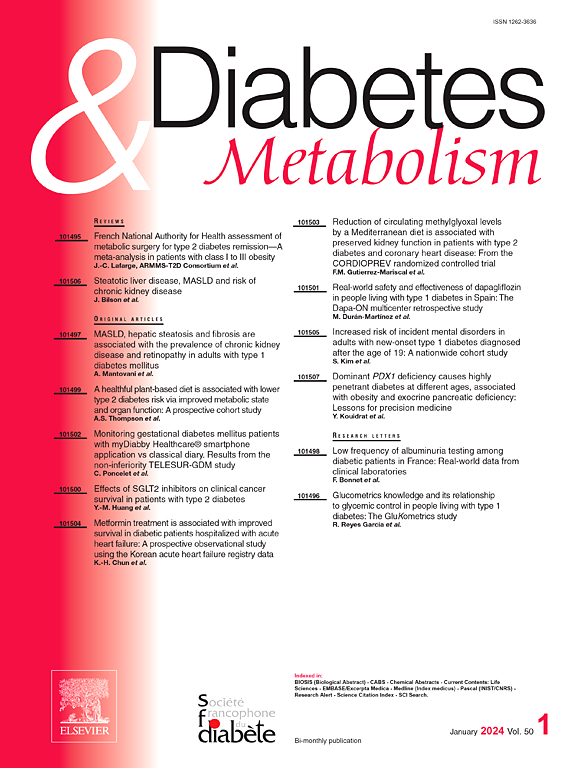眼科评估在小儿胰岛素依赖型糖尿病正确诊断中的意义:来自新型WFS1变异的经验教训。
IF 4.7
2区 医学
Q1 ENDOCRINOLOGY & METABOLISM
引用次数: 0
摘要
Wolfram综合征1是一种常染色体隐性遗传病,通常以胰岛素依赖型糖尿病开始,但具有固有的进行性最终致命的神经变性。我们报告了两例儿童病例,被称为不调节胰岛素依赖性糖尿病,最初被误诊为1型糖尿病,其中全外显子组测序证实了Wolfram综合征的临床诊断与新的Wolfram综合征基因1变异。一名11岁的亚洲男性难民,自6岁起被推测为1型糖尿病,承认过去6个月视力进行性下降,但仅在眼科检查显示双侧视神经萎缩后,通过光学相干断层扫描和视网膜神经纤维层变薄证实,导致基因检测并发现一种新的纯合错义变异(c.1598C>T, p.Pro533Leu)。一名15岁男性,自3岁起患有严重进行性自闭症谱系障碍,自9岁起患有调节不良的1型糖尿病,在就诊时有进行性神经退行性疾病的迹象。双侧视神经苍白和感音神经性听力丧失。基因检测显示致病性Wolfram综合征基因1变异c.1523_1524delTA;p.Tyr508CysfsTer34(移码缺失)与先前未描述的错义变体C . 497t >;C;p.Leu166Pro,现在被重新归类为可能致病的。这两个病例强调了眼科评估在小儿胰岛素依赖型糖尿病的早期诊断工作中的重要性,当自身免疫未得到证实时。尽管目前的指南没有强制要求,但至少对胰岛素依赖型糖尿病患者进行早期眼科评估,可以及时诊断Wolfram综合征,促进多学科干预,并有可能纳入新兴的疾病改善疗法。本文章由计算机程序翻译,如有差异,请以英文原文为准。
The significance of ophthalmological evaluation in the correct diagnosis of pediatric insulin-dependent diabetes mellitus: lessons from novel WFS1 variants
Wolfram syndrome 1 is an autosomal recessive disorder often commencing as insulin dependent diabetes, but with inherent progressive ultimately fatal neurodegeneration. We report two pediatric cases, referred as unregulated insulin dependent diabetes mellitus, initially misdiagnosed as type 1 diabetes, in whom whole exome sequencing confirmed the clinical diagnosis of Wolfram syndrome with novel Wolfram syndrome gene 1 variants. An 11-year-old Asian male refugee with presumed type 1 diabetes since the age of 6 years, acknowledged progressive visual decline the last 6 months, but only after ophthalmological evaluation revealing bilateral optic atrophy, confirmed by optical coherence tomography and retinal nerve fiber layer thinning, leading to genetic testing and revealing a novel homozygous missense variant (c.1598C>T, p.Pro533Leu). A 15-year-old male with severely progressive autism spectrum disorder since the age of 3 years, and poorly regulated presumed type 1 diabetes since the age of 9 years, had signs of a progressive neurodegenerative disorder at presentation. Bilateral optic nerve pallor and sensorineural hearing loss were documented. Genetic testing revealed the pathogenic Wolfram syndrome gene 1 variant c.1523_1524delTA; p.Tyr508CysfsTer34 (frameshift deletion) in trans with the previously undescribed missense variant c.497T>C; p.Leu166Pro, reclassified now as likely pathogenic. Both cases highlight the importance of ophthalmological evaluation in the early diagnostic workup of pediatric insulin dependent diabetes when autoimmunity is not confirmed. Although not mandated by current guidelines, early ophthalmologic assessment, at least in insulin dependent diabetes with non-previously established autoimmunity, can enable timely diagnosis of Wolfram syndrome, enabling prompt multidisciplinary intervention and potential enrollment in emerging disease-modifying therapies.
求助全文
通过发布文献求助,成功后即可免费获取论文全文。
去求助
来源期刊

Diabetes & metabolism
医学-内分泌学与代谢
CiteScore
12.00
自引率
4.20%
发文量
86
审稿时长
13 days
期刊介绍:
A high quality scientific journal with an international readership
Official publication of the SFD, Diabetes & Metabolism, publishes high-quality papers by leading teams, forming a close link between hospital and research units. Diabetes & Metabolism is published in English language and is indexed in all major databases with its impact factor constantly progressing.
Diabetes & Metabolism contains original articles, short reports and comprehensive reviews.
 求助内容:
求助内容: 应助结果提醒方式:
应助结果提醒方式:


